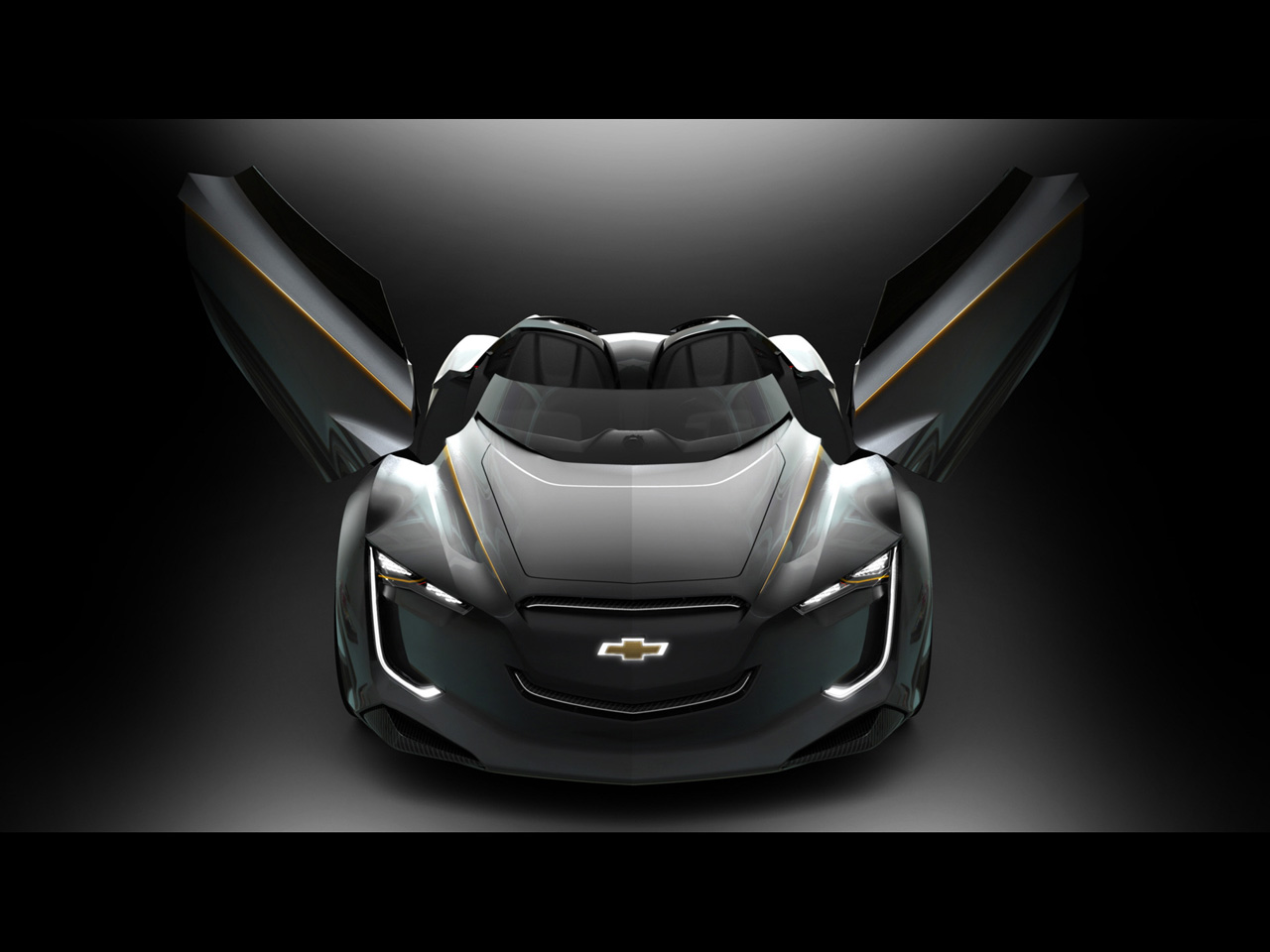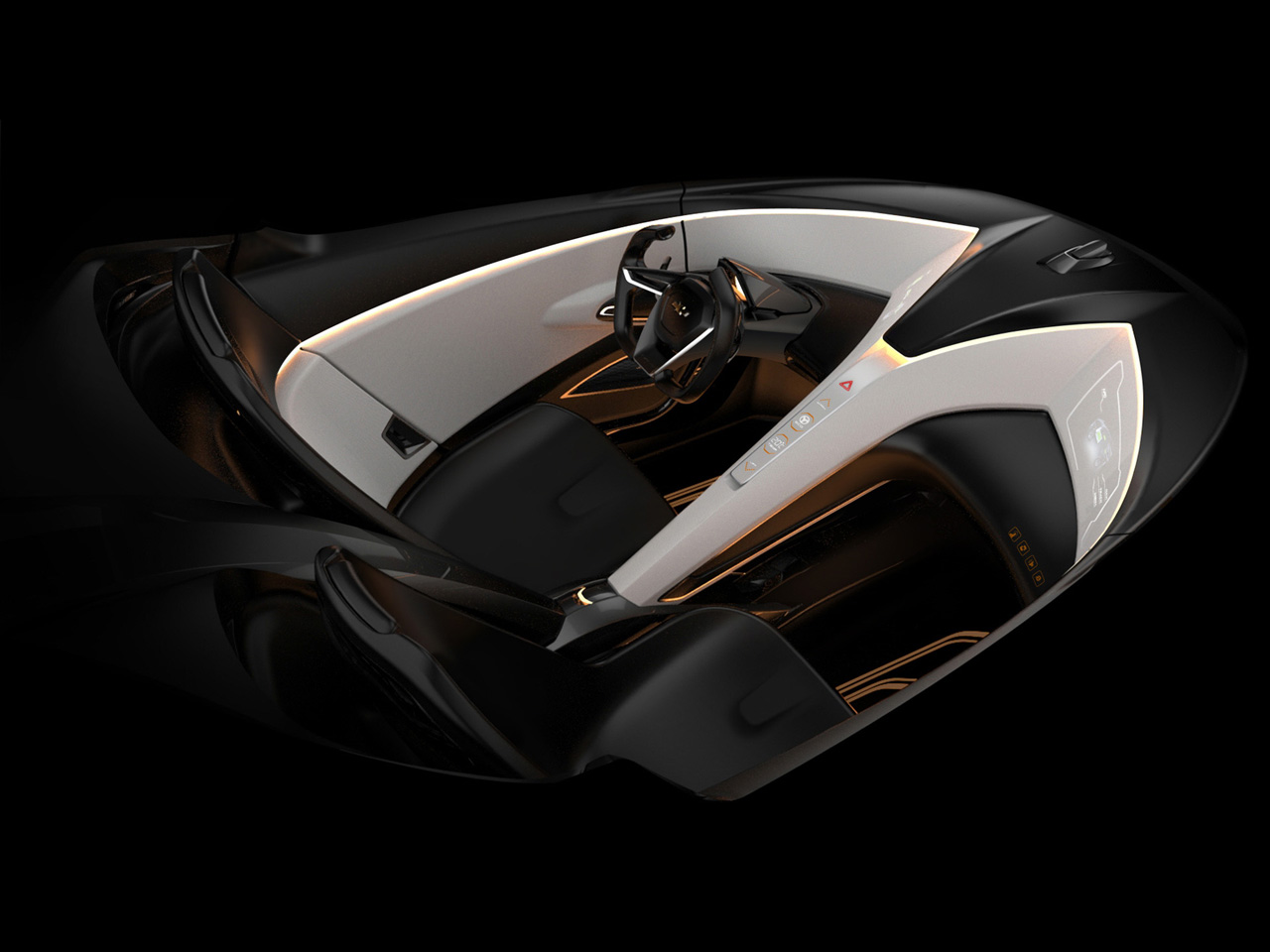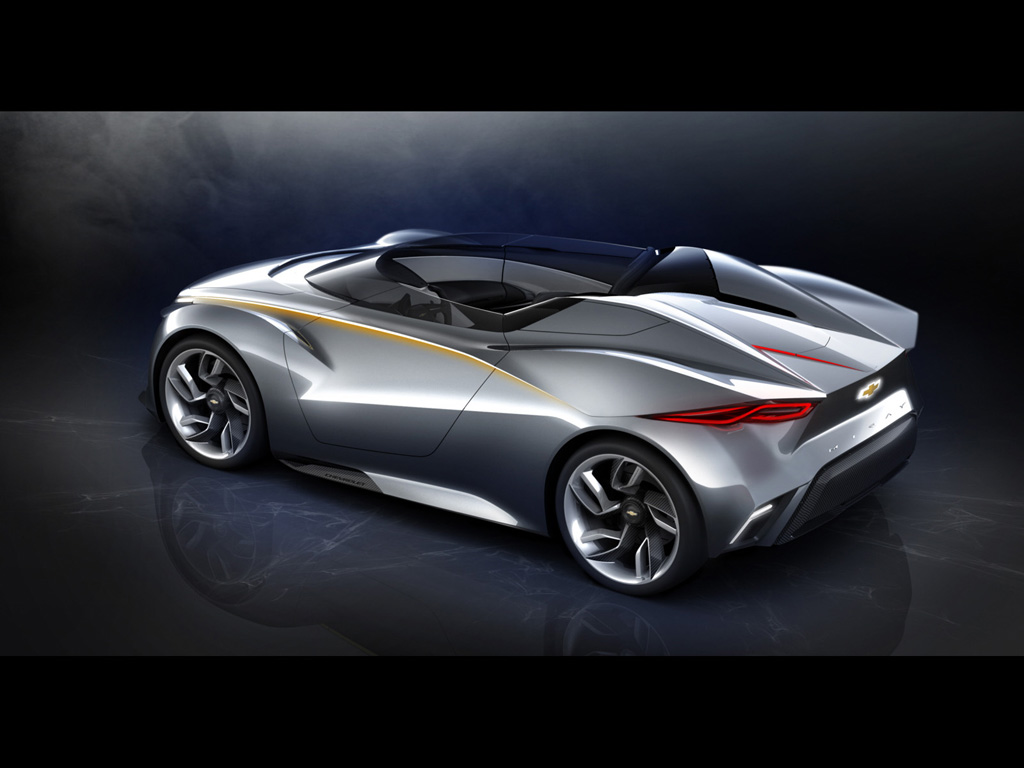2011 Chevrolet Mi-ray Roadster Concept
|
Price |
-- |
Production |
-- | ||
|
Engine |
1.5 liter inline-4 hybrid |
Weight |
-- | ||
|
Aspiration |
-- |
Torque |
-- | ||
|
HP |
-- |
HP/Weight |
-- | ||
|
HP/Liter |
-- |
1/4 mile |
-- | ||
|
0-62 mph |
-- |
Top Speed |
-- |
(from GM Press Release) Chevrolet Introduces Mi-ray Roadster Concept
Innovative Hybrid “Mid-Electric”
Propulsion System Celebrates Brand’s Design Heritage
in Its Newest Market
Seoul –Chevrolet
introduced the Mi-ray concept today at the 2011 Seoul Motor Show.
The roadster celebrates Chevrolet’s 100-year heritage of designing
expressive vehicles in the brand’s newest market.
According to GM Korea President and CEO Mike Arcamone, “‘Mi-ray’ is
Korean for ‘future.’ As GM rolls out Chevrolet across Korea, the
Mi-ray concept offers an exploration of future possibilities for the
brand. It strengthens the bond between car and driver, creating a
fresh look at what sports cars of the future might be.”
The Mi-ray was developed at the GM Advanced Design Studio in Seoul.
Combining cutting-edge hybrid propulsion technology and advanced
styling, it balances iconic Chevrolet design cues with a future
design vision as Chevrolet celebrates its centennial in 2011.
Classic Exterior
The Mi-ray pays tribute
to Chevrolet’s sports car heritage. It is small and open like the
1963 Monza SS, and light and purposeful like the 1962 Corvair Super
Spyder. Its aerodynamic fuselage is reminiscent of modern jet
fighters.
Made of carbon fiber and CFRP (carbon fiber-reinforced plastic), the
wedged body side is divided by an angled character line, with
ambient lighting underneath. This accent creates a sweeping line of
light when the car is in motion, bringing a warm glow to the
sculptured body. Le Mans racer-style scissor doors open up and out
of the way for dramatic access to the interior.
The powerful front end offers a reinterpretation of the Chevrolet
face. The Mi-ray’s dual port grille is flanked by LED headlamps with
new signature daytime running lamps. The front and rear fenders
evoke Chevrolet Corvettes of the past and express the concept’s
sports car spirit. At the corners, carbon-fiber spoilers help
control down force and airflow.
Distinctive retractable flaps provide additional airflow control
while providing access to the charge port on one side and the fuel
filler on the other. The charge port also features an external
battery charge indicator. Each rear fender contains individual cargo
space for the storage of small items. Under the ducktail surface,
the taillamps provide a new interpretation of Chevrolet’s twin
element identity.
The Mi-ray features aluminum-carbon fiber composite 20-inch wheels
in front and 21-inch wheels in the rear. The strong turbine theme
evokes movement, even when the Mi-ray is stationary.
The heavily tapered top view enhances the Mi-ray’s purposeful image.
From above, the cabin has a unique diamond shape.
Sporty Interior
The interior of the
Mi-ray echoes Chevrolet’s racing heritage. As with the exterior, it
takes inspiration from jet fighters. The Mi-ray contains a melange
of brushed aluminum, natural leather, white fabric and liquid metal
surfaces, for an overall effect of sculptural velocity.
The interior compartment is surrounded by a carbon fiber shell,
which gives it a lightweight yet rigid structure. Its flowing, yet
slightly tensioned, twin cockpit tightly wraps around the driver and
passenger. The cockpit is driver focused, drawing inspiration from
the iconic Chevrolet sports car. However, the passenger is also
fully engaged in the driving experience.
Asymmetric seats flow from the door, forming a symmetric interior
that gives the driver a feeling of being fully connected with the
car. Ambient lighting, which starts from the upper instrument panel
and flows into the seat back area, adds a sense of luxury. Seat
cushions and headrests are connected by the lightweight carbon fiber
shell and mounted on a single aluminum rail. The headrest area
follows the exterior form, integrating with an air scarf for
open-air driving.
Designers took a unique approach to displaying information, using
back projection on the instrument panel. Information in front of the
driver has been prioritized into three zones. Immediately in front
is vehicle performance. It is flanked on the left by range and on
the right by navigation and mileage figures. This eliminates
unnecessary visual clutter, allowing the driver to focus on the
thrill of driving.
The center touch screen flows down to an aluminum support, which
evokes a fighter jet’s nose with the landing gear down. The exterior
surface waterfalls down into the interior to meet the reinforced
console, connecting the front and rear of the car.
The centrally located start button is also inspired by a jet
aircraft. When the button is pressed, the column-mounted retractable
meter cluster rises like a jet fighter canopy and “Interactive
Projection” appears on the white surface.
Retractable rearview cameras, which replace traditional rearview
mirrors, extend from the side glass electrically. In city driving,
the forward-facing camera operates in conjunction with GPS to
overlay navigation information with real-time video.
Fuel-Efficient, High-Performance Propulsion System
The Mi-ray features a
concept “mid-electric” propulsion system, located primarily behind
and beneath the driver, that maximizes performance and fuel
efficiency.
“Many of the components in the Mi-ray’s propulsion system are a
logical extension of GM’s current technology portfolio,” said Uwe
Grebe, executive director for GM Powertrain Advanced Engineering.
“The concept shows the potential for reconfiguring, rescaling and
extending today’s propulsion technologies.”
The Mi-ray is propelled by two front-mounted 15-kW electric motors
for quick acceleration and zero emissions in urban driving. The
motors are powered by a 1.6-kWh lithium-ion battery that is charged
through regenerative braking energy. The Mi-ray has the capability
of being switched from front-wheel drive to rear-wheel drive.
For performance driving, the Mi-ray’s 1.5-liter four-cylinder
turbocharged engine combines with the electric motors, providing
spirited torque control to both the left and right wheels as needed.
The high-tech engine, mounted behind the cockpit, drives the rear
wheels while seamlessly integrating electrification technology that
defines a new standard in the compact roadster segment.
A dual-clutch transmission (DCT) enables a reduction in the
powertrain’s size by eliminating the torque converter. Shifts are
quick and firm. The shift pattern has been tuned for improved top
speed in performance mode. A start-stop system works in conjunction
with the DCT.
“The propulsion concept fits perfectly with the rest of the vehicle,
delivering big performance in a small footprint, on the road and in
the environment,” said Arcamone. “By combining GM propulsion
technology and visionary design, the Mi-ray points to the future of
Chevrolets around the globe – expressive, youthful and
entertaining.”
About Chevrolet
Founded in Detroit in 1911, Chevrolet celebrates its centennial as a global automotive brand with annual sales of about 4.25 million vehicles in more than 130 countries. Chevrolet provides consumers with fuel-efficient, safe and reliable vehicles that deliver high quality, expressive design, spirited performance and value. The Chevrolet portfolio includes iconic performance cars such as Corvette and Camaro; dependable, long-lasting pickups and SUVs such as Silverado and Suburban; and award-winning passenger cars and crossovers such as Spark, Cruze, Malibu, Equinox and Traverse. Chevrolet also offers “gas-friendly to gas-free" solutions including Cruze Eco and Volt. Cruze Eco offers 42 mpg highway while Volt offers 35 miles of electric, gasoline-free driving and an additional 344 miles of extended range. Most new Chevrolet models offer OnStar safety, security and convenience technologies including OnStar Hands-Free Calling, Automatic Crash Response and Stolen Vehicle Slowdown. More information regarding Chevrolet models can be found at www.chevrolet.com.



